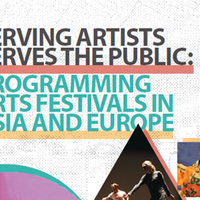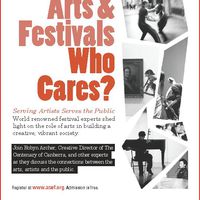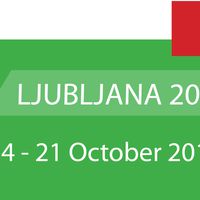Connecting the next generation of festival directors
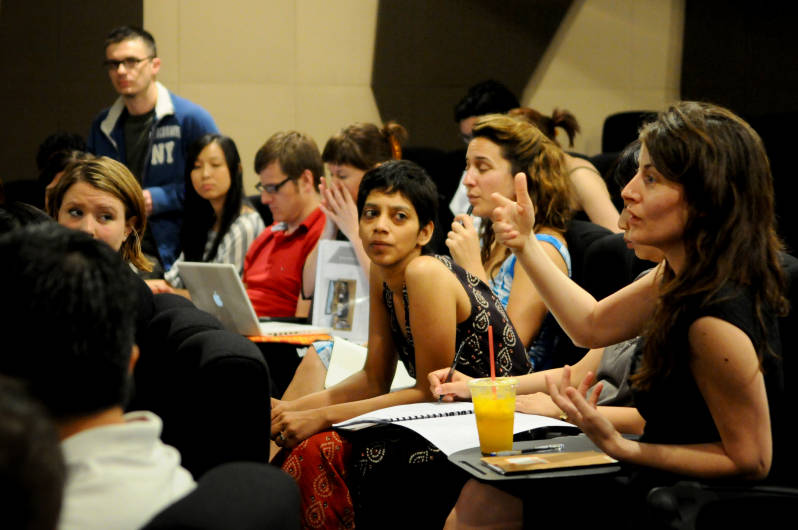 The Atelier for Young Festival Managers, which took place in Singapore from 14 to 21 May 2011 alongside the Singapore Arts Festival, was an intensive training programme that encouraged a reflection on the role of festivals in today’s societies. The week-long programme gathered together 34 young festival managers from 20 countries worldwide and consisted of discussions, workshops, small group debates and presentations from world-renowned festival directors. It aimed to encourage the next generation to share their experiences and experiment, learning from the successes and failures of knowledgeable directors.
The Atelier for Young Festival Managers, which took place in Singapore from 14 to 21 May 2011 alongside the Singapore Arts Festival, was an intensive training programme that encouraged a reflection on the role of festivals in today’s societies. The week-long programme gathered together 34 young festival managers from 20 countries worldwide and consisted of discussions, workshops, small group debates and presentations from world-renowned festival directors. It aimed to encourage the next generation to share their experiences and experiment, learning from the successes and failures of knowledgeable directors.Artist versus audience
The relationship between audiences and artists was a topic that was raised regularly throughout the Atelier. Is it the role of festival directors to present something that is familiar and comfortable for an audience? Or should festivals aim rather to challenge these expectations by introducing new work?
[caption id="attachment_11136" align="alignright" width="450" caption="The 3rd edition of the Atelier for Young Festival Managers, and the 1st to be held in Asia, LASALLE College of the Arts in Singapore"]
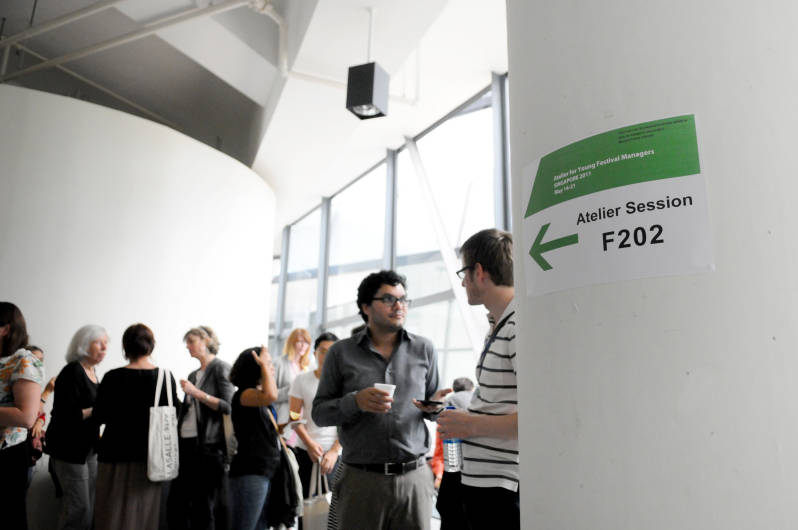 [/caption]
[/caption]In many instances, European festival programming tradition firmly places the emphasis on the artist. That is, the development of the artist and the artistic output are preferred to catering to the perceived needs of the audience. It is then the aim of the festival to guide the audience and introduce this new work in a way that they can access. This emphasis is illustrated by the quote by Bernard Faivre d'Arcier, president of the Lyon La Biennales de la Danse, which guides the whole Atelier: “The true role of a festival is to help artists to dare, to engage in new projects.” In this context, a festival, above all else, is seen as a nurturing ground for the creation of innovative art, as a space within which artists are encouraged to take risks.
However, in other contexts, the audience plays a larger role. In an economic climate where the public is concerned with how government money is spent, the arts are perhaps not at the top of the funding list. As a result, the importance of festivals could be validated through the presence of large audiences who are attracted by works that are well-known or less risky. In another example of audience expectations, it was commented during the Atelier discussions that Singapore audiences often have more confidence in attending events that come from Europe or the United States of America rather than seeing works from their own region.
In the discussions, participants expressed their belief that it is a requirement of festivals to regularly push the expected boundaries by slowly introducing new ideas and concepts while at the same time retaining enough of the familiar in order to connect with audiences. As emphasised by former Singapore Arts Festival Director Goh Ching-Lee during a panel discussion on Arts Festivals in Asia, festivals need to make a difference. This cannot happen if directors stay within the expected parameters established by the audience. Tay Tong, Managing Director of Theatreworks and Director of Arts Network Asia, added that festivals can change perceptions and gradually grow audiences. It is through this gradual process that new work can be introduced and audience expectation can be shifted.
[caption id="attachment_11142" align="aligncenter" width="563" caption="34 young festival professionals came to Singapore for the Atelier for Young Festival Managers to learn from renowned experts"]
This tension between audiences and artists was highlighted in the public lecture given by Robyn Archer, director of Light in Winter festival, Australia, on 20 May, which attracted an audience of over 200. Her lecture, around the topic of Serving Artists Serves the Public, touched on issues such as funding in the arts; the importance of the arts (or perceived lack of it in the eyes of many societies); creativity; elitism in the arts; practicing artists; and community’s involvement in the arts. She stated that “festivals are often in a unique position to offer all kinds of opportunities - to artists whose passion is to stimulate us, not just to repeat things we already know and love.” It is then perhaps the responsibility of festival directors to be the conduit between artists and audiences.
Asian festivals, European models?
Given that this European initiative was being held for the first time in Asia, it was perhaps not surprising that many of the topics debated during the week turned towards the different models of festivals that can be found in the two regions. In debating the need for a specific Asian model, there was talk of the challenges of a regional model, given the diversity within Asia. Furthermore, many Asian festivals, some established as long as 40 years ago, follow the European festival model. This has proven to be a successful model and does not necessarily need to be discarded.
[caption id="attachment_11146" align="alignright" width="451" caption="Robyn Archer gives her keynote speech at the public talk “Serving Artists Serves the Public”"]
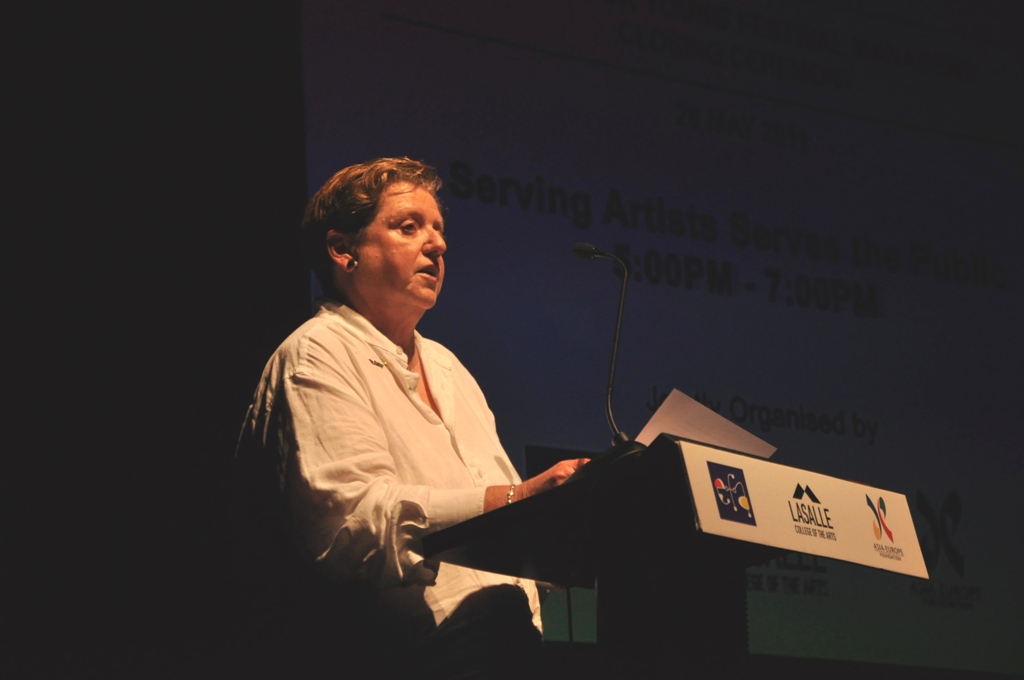 [/caption]
[/caption]Perhaps one difference in the 21st century between Asian and European festivals is the importance of community. During the Atelier, Wai Lap Kwong from the Guangdong Modern Dance Festival, China, questioned whether contemporary society has lost the celebratory tradition which was the origin of the festival. Similarly, have festivals lost the spontaneous instinct of artistic expression? As one participant from Singapore emphasised, much Asian art is understood through tradition. This does not necessarily mean that it is static and entrenched only in the past. Whereas Asian artists may choose to promote a return to the local, European artists have often turned to Asia as an exotic other that can provide an insight into tradition which they feel Europe has lost touch with.
Perhaps these questions of tradition are especially relevant as festivals become more and more international in focus with regards to their programming and the audiences they attract. Rose Fenton, co-founder of the London International Theatre Festival and an Atelier mentor, emphasised that when presenting Asian work in Europe, it is important to find the context and natural links to help bridge cultural understanding. Co-productions between Asia and Europe go a long way to fostering this understanding. This is not just a matter of bringing over a troop of performers, but working over a long period of time on a project together, with both parties compromising and contributing to the discussion.
[caption id="attachment_11148" align="aligncenter" width="560" caption="Panel discussion with Atelier mentors and key Singapore cultural leaders at Esplanade Theatres on the Bay (Audrey Wong, Nele Hertling, Hugo De Greef, Benson Puah, Goh Ching-Lee, Tay Tong and Carla Van Zon)"]
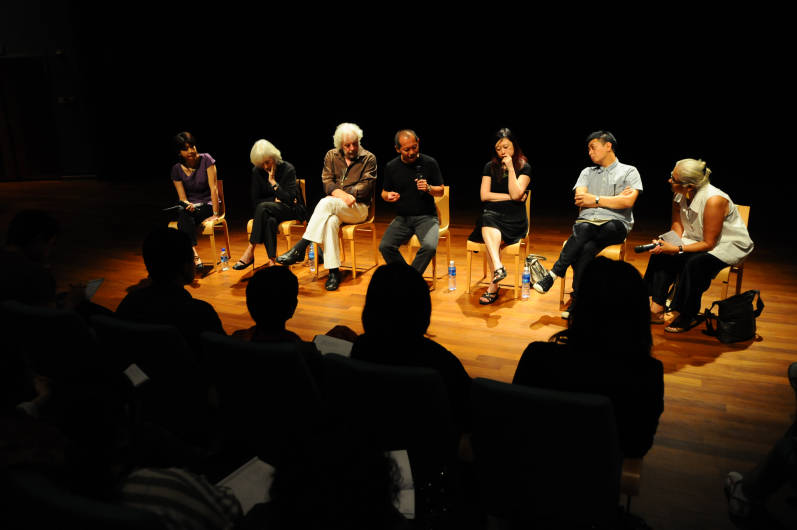 [/caption]
[/caption]Even taking into consideration the differences between regions, the Atelier proved that many concerns were global – the struggle of artists to find platforms of expression; the difficulty of finding sustainable funding; and the challenge of establishing a festival in the face of staunch opposition. These and many more issues were debated throughout the Atelier and the participants left feeling inspired that they were not alone.
Future editions of the Atelier
The Atelier for Young Festival Managers is an initiative of the European Festivals Association (EFA). The Singapore edition was the third to take place since the programme was initiated in 2009 and was co-organised by EFA, the Asia-Europe Foundation (ASEF) and LASALLE College of the Arts. Associated organisations included the Singapore Arts Festival, CultureLink and the Association of Asian Performing Arts Festivals (AAPAF).
ASEF's contribution to this project was made possible through the generous support of Dr Haruhisa Handa, chairman of the International Foundation for Arts & Culture (IFAC).
The next Atelier will take place in Izmir, Turkey, in October 2011. If you are interested in participating in future editions, keep an eye on the EFA Atelier website.
Claire Wilson is a Project Officer in the Cultural Exchange Department at the Asia-Europe Foundation
Similar content
posted on
18 Apr 2013
from - to
20 May 2011 - 20 May 2011
posted on
15 Dec 2010
deadline
30 Jun 2012
posted on
08 Nov 2010
deadline
10 Sep 2013

